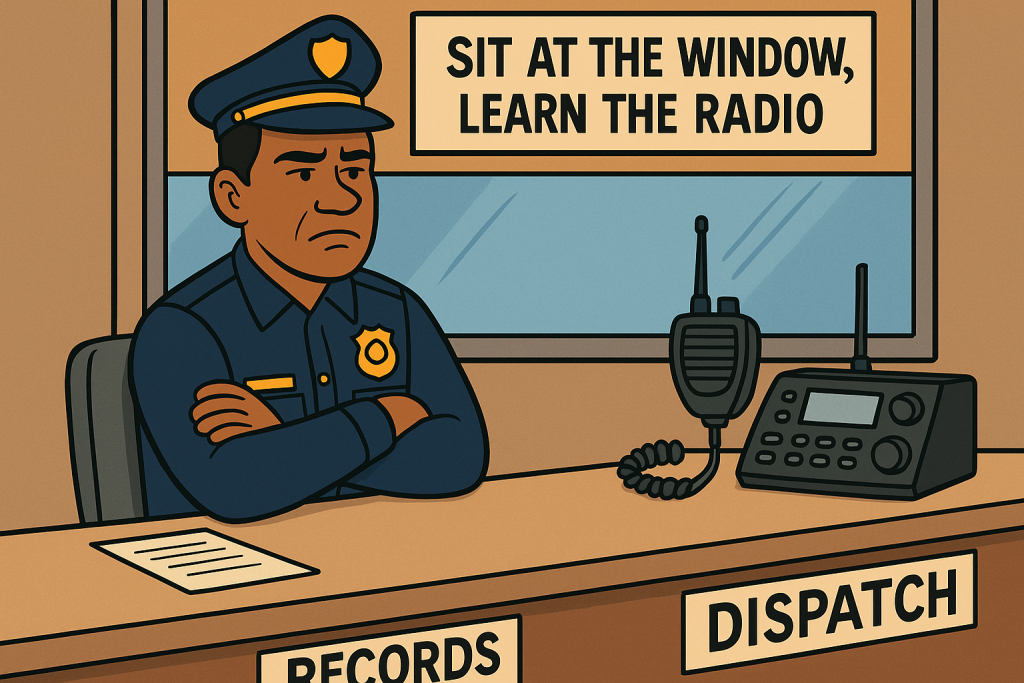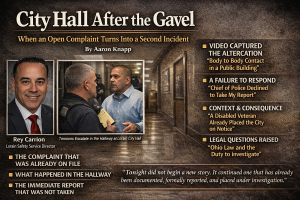Episode 3: The Dispatch Directive and “Unprecedented Performance Testing”

A Serialized Investigative Series by Aaron C. Knapp
In this third installment of our Substack investigative series, Inside the Blue Wall: The McCann-Middlebrooks Files, we explore a chapter that goes beyond office reassignments and reprimands. We enter the heart of what Corey Middlebrooks calls the most demeaning experience of his professional career: a mandate to not only lead the Support Services Division but to learn and perform the roles of civilian dispatchers and records clerks — positions no previous captain was ever asked to fill.
“Sit at the Window, Learn the Radio”: The Dispatch Order

Following his reassignment to Support Services, Captain Middlebrooks was ordered by Chief McCann to immerse himself in the day-to-day operations of both the dispatch center and records division. McCann’s justification was clear: Middlebrooks had no prior experience in Support Services, and as a captain responsible for overseeing those functions, he needed a basic understanding of how they worked.
Middlebrooks didn’t deny his lack of experience. In fact, he acknowledged that he had never supervised dispatch or records prior to his assignment. But what he did contest was the method. Middlebrooks claimed that he was ordered to perform duties at the front records window — a job typically reserved for civilian employees — and to sit at the dispatch radio to observe and engage in tasks.
He characterized these directives as humiliating, professionally beneath his rank, and, in his view, racially targeted.
“No Captain Has Ever…”: The Claim of Unprecedented Tasking
According to Middlebrooks, no other captain had ever been subjected to such training. He cited his predecessor, Captain Mathewson, as an example — arguing that Mathewson had been given an assistant patrol commander to ease his workload, while Middlebrooks had to “learn on the fly” with minimal guidance. He also pointed out that two white officers were now handling what had been his singular post.
OPS pressed him on whether the Chief had the right to assign him these responsibilities. Middlebrooks admitted that McCann had the managerial authority. However, he questioned the fairness and motive: why now, and why him?
OPS documented that Middlebrooks had indeed been given a formal development plan. He was to learn dispatch procedures, records documentation, and LEADS/NCIC systems. But instead of embracing the task, Middlebrooks resisted — even going so far as to tell peers that the duties were beneath him, a claim he would later deny in his interview.
OPS also confirmed that no other captain had been issued a similar tasking plan.
Chief McCann and his defenders would later argue that Middlebrooks’s learning curve justified the extra measures. But within the department, this deviation from precedent drew raised eyebrows.
It is generally not typical to assign new police captains to clerical or dispatcher-level duties. These are specialized, often civilian-held roles that support emergency communications and records processing. Captains are expected to lead, strategize, and supervise — not sit dispatch or answer walk-ins at the front desk. Assigning a new captain to these tasks, especially without precedent, is deeply irregular and arguably disrespectful to the position.
Role Confusion and Responsibility: A Break from Norms
Dispatch is a specialized area requiring focused, technical knowledge. Dispatchers undergo extensive training to operate radio systems, triage emergency calls, and communicate under stress. While a captain may need operational awareness, they are not typically trained or expected to “learn to dispatch.”
Leadership roles are about delegation and oversight — not execution of support tasks. By placing Middlebrooks in the dispatcher seat, McCann blurred professional boundaries and sent a message to the department: this Black captain would be made to earn his post through servitude, not leadership.
“Perception vs. Policy”: What the Interviews Reveal
OPS Director Williams asked a pointed question during the Garrity interview: “Do you think the Chief assigned you these duties because of your race?” Middlebrooks responded, “Yes.” Yet when probed further, his rationale became murky. He said he couldn’t read the Chief’s mind, but that the disparity in how he was treated compared to white officers led him to that belief.
The record shows that Middlebrooks did not file a grievance or request clarification about the development plan. Nor did he express formal concern about the tasks until well after his demotion. In fact, OPS uncovered no documentation in which Middlebrooks objected to the directive in real time — something they flagged as undermining his claim of retaliation.
Still, the questions persist: was this truly about professional development? Or was it a form of public degradation? Middlebrooks described officers questioning why he was at the front window. Even Assistant Prosecutor Mallory Santiago reportedly asked, “Why are you sitting there?”
That’s not proof — but it is perception. And in a workplace already strained by questions of equity and morale, perception often becomes reality.
Final Thought: An Internal Redline?
There’s no question that the Lorain Police Department had the authority to ensure its captains are competent across divisions. But Middlebrook’s claim — that the training was designed more to embarrass than educate — cannot be easily dismissed.
He was one of the few Black captains in department history. He was assigned a former storage room for an office. His desktop computer was removed. He was not provided a direct assistant — unlike his white predecessor. He was asked to perform clerical and dispatch tasks that no white officer in his position had ever been assigned.
These facts alone raise red flags. The department’s justification may hold water administratively, but context matters. When Black professionals are subjected to “unprecedented” protocols while white counterparts are afforded institutional grace, the explanation of “standard procedure” begins to crack.
In some ways, the parallels between Middlebrooks’s treatment and the broader history of racial redlining in American institutions are impossible to ignore. Redlining was never just about neighborhoods; it was about exclusion by design — withholding resources, imposing higher barriers, and justifying disparities through bureaucratic language.
In the same way redlining shaped segregated cities, McCann’s administrative tactics appear to have created an internal redline — one that boxed Middlebrooks into a role of subordination and scrutiny rather than leadership and growth. The veneer of policy masks the roots of power, and when those roots run deep with favoritism, homophobia, and racial bias, the result is systemic exclusion.
Chief McCann has a known history of homophobic commentary, according to multiple sources and interviews. His disciplinary record shows inconsistent enforcement, and his preferred inner circle appears overwhelmingly white and male.
This is not merely about professional development — it’s about power, perception, and prejudice. Middlebrooks’s experience appears less like training and more like a calculated public shaming — one that exploited rank, race, and silence.
Was this a comprehensive development strategy — or a slow administrative bleed-out meant to humiliate a man who had challenged the status quo?
Episode 3 leaves us with a troubling truth: in hierarchical institutions, power often disguises itself as policy — and racial disparity often hides behind procedure. In the case of Captain Middlebrooks, what’s cloaked in professional development may, in truth, be a continuation of institutional gatekeeping — this time, behind a dispatch desk.
Coming Next: The Baez Confrontation and the “Tool for Discrediting”
In Episode 4, we examine the complicated relationship between Officer Miguel Baez — a now-retired officer of Latino descent — and both men at the center of this investigation. What really happened in the Chief’s office? Was Baez a whistleblower — or a pawn?






